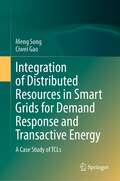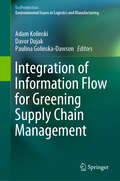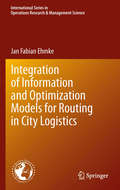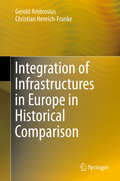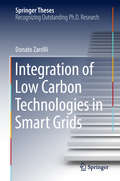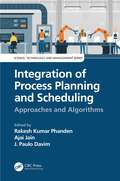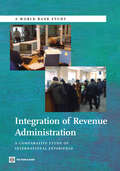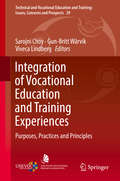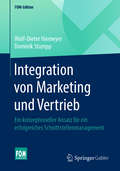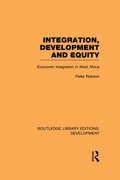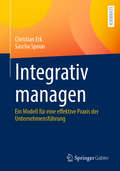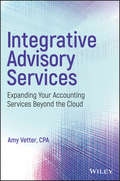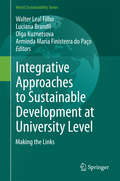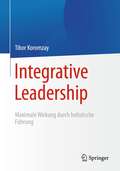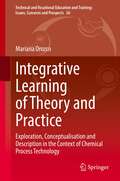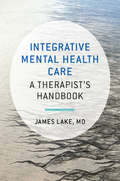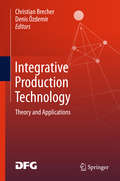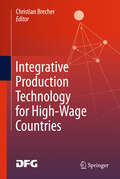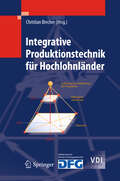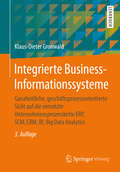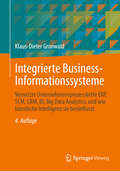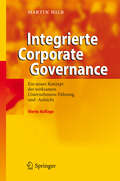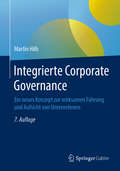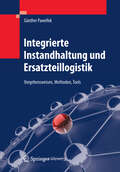- Table View
- List View
Integration of Distributed Resources in Smart Grids for Demand Response and Transactive Energy: A Case Study of TCLs
by Meng Song Ciwei GaoThe proliferation of renewable energy enhances the sustainability of power systems, but the inherent variability also poses great challenges to the planning and operation of large power grids. The corresponding electric power deficiencies can be compensated by fast ramping generators and energy storage devices. However, frequent ramp up/down power adjustments can increase the operation and the maintenance cost of generators. Moreover, storage devices are regarded as costly alternatives. Demand response (DR) and transactive energy can address this problem owing to its attractive and versatile capability for balancing the supply-demand, improving energy efficiency, and enhancing system resilience. Distributed resources are the typical participants of DR and transactive energy programs, which greatly contribute to keep the supply and demand in a balance. Thermostatically controlled loads (TCLs) (i.e., air conditioners, water heaters, and refrigerators) represent an example of distributed resources, the ratio of which to the total power consumption in developed countries is up to 30%–40%. Providing tremendous potentials in adjustable power consumption, TCLs have attracted major interests in DR and transactive energy opportunities. It has highlighted the advantages of TCLs in responding to uncertainties in power systems. This book provides an insight of TCLs as typical distributed resources in smart grids for demand response and transactive energy to address the imbalance between supply and demand problems in power systems. The key points on analysis of uncertainty parameters, aggregated control models, battery modelling, multi-time scale control, transactive control and robust restoration of TCLs are all included. These are the research points of smart grids and deserve much attention. We believe this book will offer the related researcher a better understanding on the integration of distributed resources into smart grid for demand response and transactive energy. And it will be helpful to address the problems in practical projects.
Integration of Information Flow for Greening Supply Chain Management (EcoProduction)
by Paulina Golinska-Dawson Adam Kolinski Davor DujakThis book provides a framework for integrating information management in supply chains. Current trends in business practice have made it necessary to explore the potential held by information integration with regard to environmental aspects. Information flow integration provides an opportunity to focus on the creation of a more “green” supply chain. However, it is currently difficult to identify the impact of information integration on greening a supply chain in a wide range of practical applications. Accordingly, this book focuses on the potential value of information integration solutions in terms of greening supply chain management. It covers the following major topics: Application of information flow standards in the supply chain Information systems and technological solutions for integrating information flows in supply chainsThe Internet of Things and the industry 4.0 concept, with regard to the integration of supply chains Modeling and simulation of logistics processesDecision-making tools enabling the greening of supply chains
Integration of Information and Optimization Models for Routing in City Logistics
by Jan Fabian EhmkeAs urban congestion continues to be an ever increasing problem, routing in these settings has become an important area of operations research. This monograph provides cutting-edge research, utilizing the recent advances in technology, to quantify the value of dynamic, time-dependent information for advanced vehicle routing in city logistics. The methodology of traffic data collection is enhanced by GPS based data collection, resulting in a comprehensive number of travel time records. Data Mining is also applied to derive dynamic information models as required by time-dependent optimization. Finally, well-known approaches of vehicle routing are adapted in order to handle dynamic information models. This book interweaves the usually distinct areas of traffic data collection, information retrieval and time-dependent optimization by an integrated methodological approach, which refers to synergies of Data Mining and Operations Research techniques by example of city logistics applications. These procedures will help improve the reliability of logistics services in congested urban areas.
Integration of Infrastructures in Europe in Historical Comparison
by Gerold Ambrosius Christian Henrich-FrankeThis book compares the cross-border integration of infrastructures in Europe such as post, telecommunication and transportation in the 19th century and the period following the Second World War. In addition to providing a unique perspective on the development of cross-border infrastructures and the international regimes regulating them, it offers the first systematic comparison of a variety of infrastructure sectors, identifies general developmental trends and supplies theoretical explanations. In this regard, integration is defined as international standardization, network building and the establishment of international organizations to regulate cross-border infrastructures.
Integration of Low Carbon Technologies in Smart Grids (Springer Theses)
by Donato ZarrilliThe thesis provides different opportunities and ideas to face some current challenges in the electricity systems. It focuses on the effective and efficient integration of distributed low carbon technologies in the grid of the future. Planning and operation problems for different clean solutions, such as market bidding strategies for intermittent energy producers, demand side management algorithms for smart buildings, and electrical storage options for network operators, are studied for facilitating the integration of renewable energy sources in the power system chain.
Integration of Process Planning and Scheduling: Approaches and Algorithms (Science, Technology, and Management)
by J. Paulo Davim Rakesh Kumar Phanden Ajai JainBoth process planning and scheduling are very important functions of manufacturing, which affect together the cost to manufacture a product and the time to deliver it. This book contains various approaches proposed by researchers to integrate the process planning and scheduling functions of manufacturing under varying configurations of shops. It is useful for both beginners and advanced researchers to understand and formulate the Integration Process Planning and Scheduling (IPPS) problem effectively. Features Covers the basics of both process planning and scheduling Presents nonlinear approaches, closed-loop approaches, as well as distributed approaches Discuss the outfit of IPPS in Industry 4.0 paradigm Includes the benchmarking problems on IPPS Contains nature-algorithms and metaheuristics for performance measurements in IPPS Presents analysis of energy-efficient objective for sustainable manufacturing in IPPS
Integration of Revenue Administration: A Comparative Study of International Experience
by World BankIn order to minimize the need for taxpayers to respond to multiple revenue agencies, some countries have integrated their revenue administrations, either by merging tax and customs administration, or unifying collection of tax and social contributions. This book examines the experience of 11 countries in doing so. Their experiences indicate that integrating collection entails modernizing the revenue administration and reducing contact between the tax office and taxpayers, thanks to the extensive use of ICT.
Integration of Vocational Education and Training Experiences: Purposes, Practices and Principles (Technical and Vocational Education and Training: Issues, Concerns and Prospects #29)
by Sarojni Choy Gun-Britt Wärvik Viveca LindbergThis book draws on experiences from a range of vocational education systems in different nation states and re-examines the purpose of providing experiences outside educational institutions; the kinds and extent of those experiences; and efforts made to ensure the integration of students’ experiences across sites. Analyses of the various vocational education systems, their purposes and practices across nations, and challenges experienced by different stakeholders illustrate different approaches to the integration of learning at different sites. The book includes a consideration of what constitutes the integration and reconciliation of experiences, and their attendant educational implications. This extends an appraisal of the concepts of integration, reconciliation, curriculum and work readiness, each of which has a range of connotations. Integration or reconciliation is differentiated from transfer of learning, which is commonly based on simple assumptions that the educational institutions will provide theory and that the workplaces will provide practice from the workplaces, and that the two can be easily linked by students. The contributions from different nation states clearly demonstrate that integration is a collaborative process and requires the agency of stakeholders operating at global, national and specific learning site levels.
Integration von Marketing und Vertrieb: Ein konzeptioneller Ansatz für ein erfolgreiches Schnittstellenmanagement (FOM-Edition)
by Wolf-Dieter Hiemeyer Dominik StumppIn diesem Buch erfahren Sie, wie Sie die Zusammenarbeit von Marketing und Vertrieb verbessernIm Zeitalter der Digitalisierung ist es für Unternehmen immer wichtiger, dass alle internen Bereiche effektiv zusammenarbeiten. Gleichzeitig steigen jedoch die Anforderungen an die vorhandenen Prozesse, um schnell auf veränderte Bedingungen des Marktes oder auf Wünsche von Kunden reagieren zu können. Ein wesentlicher Bestandteil für den Erfolg einer Firma ist die Zusammenarbeit zwischen Marketing und Vertrieb. Dieses Buch von Wolf-Dieter Hiemeyer und Dominik Stumpp beinhaltet die Ergebnisse eines empirischen Forschungsprojektes. Die Ergebnisse zeigen Ihnen nicht nur, wie Sie Konflikte zwischen Marketing und Vertrieb vermeiden, sondern erläutern darüber hinaus, welche Faktoren zu einer optimalen Zusammenarbeit der Abteilungen führen.So klappt die Integration von Marketing und VertriebDysfunktionale Konflikte sorgen dafür, dass Unternehmen langfristig ihre Ziele nicht erreichen – die Qualität leidet, Kunden sind unzufrieden und Wettbewerbsvorteile gehen verloren. In diesem Buch finden Sie ein wissenschaftlich valides Modell, mit dem Sie die Qualität der Zusammenarbeit von Marketing und Vertrieb messen können. In sieben Kapiteln erhalten Sie konkrete Handlungsempfehlungen für Ihr Marketing- und Vertriebscontrolling:Allgemeine Grundlagen des B2B-Marketings und VertriebsDie Zusammenarbeit von Marketing und VertriebIntegration von Marketing und Vertrieb – Herleitung des HypothesenmodellsMethodisches VorgehenQuantitative Datenanalyse – StrukturgleichungsmodellierungQuantitative Datenanalyse – Deskriptive Statistik mit HandlungsempfehlungenHandlungsempfehlung für die UnternehmenspraxisMit diesem Buch verbessern Sie nicht nur die Zusammenarbeit von Marketing und Vertrieb, sondern gestalten auch die Qualität Ihres Managements langfristig effektiver.
Integration, development and equity: Economic Integration In West Africa (Routledge Library Editions: Development)
by Peter RobsonThis reissue, first published in 1983, is an authoritative study of economic integration among the states of West Africa, focusing upon the issues and experience of the four main initiatives for regional integration in West Africa, namely the Economic Community of West African States, the Mano River Union, the Communauté Economique de l’Afrique de l’Ouest, and the recent initiative for the establishment of an economic and monetary union between Senegal and the Gambia.
Integrativ managen: Ein Modell für eine effektive Praxis der Unternehmensführung
by Christian Erk Sascha SpounDieses Lehrbuch klärt die grundlegenden Fragen des Managements. Um was geht es beim Managen? Welche Aufgaben, welche Rollen, welche Ziele hat Management? Welche gesicherten Erkenntnisse haben wir aus Wissenschaft und Praxis? Wie kann man als Manager Mehrwert generieren? Auf der Suche nach Antworten auf diese Fragen machen die Autoren Management in Form eines integrierten Modells versteh- und greifbar. Grundlage dieses Modells sind die Arbeiten wichtiger Managementtheoretiker der letzten 100 Jahre, die in einer vergleichenden Zusammenschau sozusagen übereinandergelegt werden. Die so identifizierten Gemeinsamkeiten werden zu einem Managementmodell integriert, das somit überzeitlich gültige Aussagen zum Thema „Management“ enthält. Diese bereiten die Manager von heute konzeptionell fundiert auf die neuen, komplexen und dynamischen Herausforderungen von morgen vor.
Integrative Advisory Services: Expanding Your Accounting Services Beyond the Cloud
by Amy VetterStop crunching numbers and start truly serving your clients Integrative Advisory Services is the CPA, accounting professional and bookkeeper's guide to the future. As technology paves the way for increased self-reliance and DIY financial services, much of the traditional data entry tasks of accounting professionals and bookkeepers will be reduced. Yet, nothing can replace the human side of the client-advisor experience and the desire to improve your clients' businesses with financial information. Technology will continue marching on, so accounting professionals must adapt to the changing marketplace to thrive in this new paradigm. This book shows you how to provide the kind of value that technology cannot: human connection. Rather than simply reporting data, today's accounting professionals have an opportunity to take a much more active role in their clients' business by analyzing the story behind the numbers, understanding both operations and finance, and guiding the client toward the outcomes they need. Creating an ongoing relationship throughout the year allows you to be proactive rather than reactive, and help your client's business at a holistic level. Your business owner and CEO clients can get the numbers from the computer too—but, they come to you for personalized advice, explanations, and guidance based on their unique situation and financial needs. This book shows you how to take on more of an advisory role and become a critical component of your client's success. Spend less time crunching numbers and more time advising clients Become an integral part of the client's decision-making process Provide real value by clearly communicating financial data analysis Become the strategic partner your client cannot do without Cloud technology, machine learning, and artificial intelligence are not the death knell for financial advisors; in fact, they're the opposite—they do the number crunching for you, leaving you more time to provide the personal guidance that no computer could. As the financial advisory industry evolves, Integrative Advisory Services is your real-world guide to adapting and thriving.
Integrative Approaches to Sustainable Development at University Level
by Walter Leal Filho Luciana Brandli Olga Kuznetsova Arminda Maria Finisterra do PaçoThis book documents and compares the experiences of a wide range of universities across the five continents with regard to sustainable development, making it of special interest to sustainability researchers and practitioners. By showcasing how integrative approaches to sustainable development at the university level can be successfully employed to bridge the gaps between disciplines, the book provides a timely contribution to the literature on sustainability and offers a valuable resource for all those interested in sustainability in a higher education context.
Integrative Leadership: Maximale Wirkung durch holistische Führung
by Tibor KoromzayDieses praxisbezogene Fachbuch Integrative Leadership erklärt, wie durch eine umfassende und integrative Perspektive eine ganzheitliche Führung ermöglicht wird, die weit über das bloße Führen von untergebenen Mitarbeitenden hinausgeht. Dadurch kann die Wirkung von Leadership massiv erhöht werden. Sie erfahren, wie verschiedene Aspekte von Leadership integral aufeinander ausgerichtet und somit Reibungsverluste vermindert werden können. Denn wer kennt dies nicht: Organisationen werden durch die Spezialisierung von Funktionen zunehmend fragmentiert. Dabei geht die Gesamtschau verloren, und es entstehen unkoordinierte Kräfte, die in verschiedene Richtungen zielen. Der Autor zeigt auf, wie diese Fragmente zu einem wirkungsvollen Ganzen zusammengefügt werden können. Basierend auf sechs Dimensionen von Leadership erhalten Sie eine Hilfestellung, um durch die Bündelung dieser Dimensionen ein Vielfaches an Wirkung zu erzielen. Dies unterstützt Sie dabei, Organisationen zu inspirierenden Orten zu machen und nachhaltige und positive Veränderungen zu generieren. Zielgruppen: Führungskräfte, Organisationsentwickler*innen, Berater*innen, Coaches, und Wirtschafts- und Organisationspsycholog*innen. Der Autor: Tibor Koromzay ist freiberuflich als Organisationsberater und Coach tätig mit den Schwerpunkten Leadership, Zusammenarbeit, Veränderung und persönliches Wachstum. Er ist Psychologe, verfügt über langjährige Führungs- und Managementerfahrung in der Industrie und langjährige Übungspraxis in Meditation und Aikido.
Integrative Learning of Theory and Practice: Exploration, Conceptualisation and Description in the Context of Chemical Process Technology (Technical and Vocational Education and Training: Issues, Concerns and Prospects #36)
by Mariana OrozcoThis book addresses the questions of what constitutes the integrative learning of theory and practice (ILTP), and how this learning progresses over time - these are important questions that have been overlooked to date. It introduces a new way of looking at the theory-practice integration and presents the conceptual and empirical research that has led to such a view. The conceptualisation of the ILTP and the description of the phenomenon of integration draw on psychological aspects of epistemological beliefs in TVET, and on philosophical aspects of social reasoning. In this inferentialist, non-dualistic epistemological perspective, theory and practice are distinguished in terms of their use in reasoning, rather than as intrinsically different forms of knowledge. In particular, the integrative learning is presented in terms of qualitative changes in chains of reasoning that connect theoretical and practical considerations. This work represents a contribution to further educational research, as it advances a novel operationalisation of the inferentialist framework. Finally, this work contributes to educational practice, as it offers evidence-based guidelines for practitioners concerned with instructional design in T-VET. The reported empirical investigations involved in-depth qualitative research methods and were conducted at a micro-level of instruction in alternating school-based and work-based programmes, in the field of Chemicals Processing Technology (CPT).
Integrative Mental Health Care: A Therapist's Handbook
by James LakeMaking sense of complementary and alternative treatments in mental health care. In mental health care, as in medical care, more and more clinicians are turning to unconventional assessment and treatment approaches to evaluate and treat their patients in the most effective way possible. But how is a clinician to makes sense of the range of complementary and alternative treatments (CAM), and when is it appropriate and safe to use conventional therapies alongside them? In this practical resource, Dr. Lake, a pioneer in the field of integrative mental healthcare, teaches readers how to integrate conventional mental healthcare--drugs and psychotherapy--with complementary and alternative approaches, including vitamins, minerals, amino acids, essential fatty acids and other natural products, mind-body practices, light therapy, music, biofeedback, energy therapies, acupuncture, and others. This is a concise, evidence-based guide to the day-to-day management of common mental health problems using an integrative approach.
Integrative Production Technology
by Christian Brecher Denis ÖzdemirIndustrial production in high-wage countries like Germany is still at risk. Yet, there are many counter-examples in which producing companies dominate their competitors by not only compensating for their specific disadvantages in terms of factor costs (e. g. wages, energy, duties and taxes) but rather by minimising waste using synchronising integrativity as well as by obtaining superior adaptivity on alternating conditions. In order to respond to the issue of economic sustainability of industrial production in high-wage countries, the leading production engineering and material research scientists of RWTH Aachen University together with renowned companies have established the Cluster of Excellence "Integrative Production Technology for High-Wage Countries". This compendium comprises the cluster's scientific results as well as a selection of business and technology cases, in which these results have been successfully implemented into industrial practice in close cooperation with more than 30 companies of the industrial production sector.
Integrative Production Technology for High-Wage Countries
by Christian BrecherIndustrial production in high-wage countries like Germany is still at risk. Yet, there are many counter-examples in which producing companies dominate their competitors by not only compensating for their specific disadvantages in terms of factor costs (e.g. wages, energy, duties and taxes) but rather by minimising waste using synchronising integrativity as well as by obtaining superior adaptivity on alternating conditions. In order to respond to the issue of economic sustainability of industrial production in high-wage countries, the leading production engineering and material research scientists of RWTH Aachen University together with renowned companies have established the Cluster of Excellence "Integrative Production Technology for High-Wage Countries". This compendium comprises the cluster's scientific results as well as a selection of business and technology cases, in which these results have been successfully implemented into industrial practice in close cooperation with more than 30 companies of the industrial production sector.
Integrative Produktionstechnik für Hochlohnländer
by Christian BrecherAuch wenn die industrielle Fertigung von Produkten in Hochlohnländern wie Deutschland gefährdet ist, gibt es viele Beispiele für Unternehmen, denen es gelingt, durch ihre Produktion den Wettbewerb zu dominieren - u. a. indem sie Verschwendung durch synchronisierende Integrativität minimieren und sich höchst adaptiv verhalten. In dem Buch werden die wissenschaftlichen Ergebnisse des Aachener Exzellenzclusters "Integrative Produktionstechnik für Hochlohnländer" dargestellt und deren erfolgreiche Umsetzung in die industrielle Praxis beschrieben.
Integrator: Choosing the Optimal Business Model for Innovation
by John Butman Harold L. Sirkin James P. AndrewThe choice of business model can have a dramatic effect on a company's ability to successfully achieve payback with a new product or service. In this chapter, the authors look at companies that have chosen integration, "doing it all themselves" in order to retain maximum control over the innovation process and to keep the majority of the payback.
Integrierte Business-Informationssysteme: Ganzheitliche, geschäftsprozessorientierte Sicht auf die vernetzte Unternehmensprozesskette ERP, SCM, CRM, BI, Big Data Analytics (Examen. Press Ser.)
by Klaus-Dieter GronwaldEnterprise Resource Planning (ERP), Supply Chain Management (SCM), Customer Relationship Management (CRM), Business Intelligence (BI) und Big Data Analytics (BDA) sind unternehmerische Aufgaben und Prozesse, die durch standardisierte Softwarelösungen unterstützt werden.Dieses Lehrbuch lässt Studierende direkt aus der Businessperspektive anhand eines rollenbasierten Business Games erfahren, wie unternehmerische Aufgaben und Prozesse mit Hilfe standardisierter Softwaresysteme realisiert werden. Dadurch vermittelt es managementorientiertes Denken und Handeln, das für Informatiker, die sich mit geschäftsprozessorientierten IT-Lösungen befassen, unerlässlich ist.Die dritte Auflage des Buches wurde vollständig überarbeitet, neu strukturiert und um aktuelle Themenbereiche wie Blockchains in der Supply Chain und die Beziehung von Big Data Analytics zu Artificial Intelligence und Machine Learning ergänzt. Die Struktur des Buches orientiert sich an der schrittweisen Implementierung und Integration der jeweiligen Informationssysteme aus Unternehmens-, Business-, und Managementsicht. Teil I enthält ausführliche Kapitel zu den behandelten Themen mit Online-Tests und -Übungen zu jedem Kapitel. Teil II führt in das Rollenspiel und in die Online-Gaming- und Simulationsumgebung ein. Ergänzendes Unterrichtsmaterial, Präsentationen, Templates und Videoclips stehen online im Gamingbereich zur Verfügung. Die für dieses Buch neu geschaffene Gaming- und Businesssimulation Kdibisglobal.com enthält neben der bisherigen Bier-Division neu eine Mineral- und Tafelwasser-Division, eine Soft-Drink-Division sowie ein Fertigungsunternehmen für Barcode-Kassensysteme mit ihren speziellen Geschäftsprozessen und Supply Chains.
Integrierte Business-Informationssysteme: Vernetzte Unternehmensprozesskette ERP, SCM, CRM, BI, Big Data Analytics, und wie künstliche Intelligenz sie beeinflusst
by Klaus-Dieter GronwaldEnterprise Resource Planning (ERP), Supply Chain Management (SCM), Customer Relationship (CRM), Business Intelligence (BI), und Big Data Analytics sind unternehmerische Aufgaben und Prozesse, die durch standardisierte Softwarelösungen realisiert werden. Methoden der künstlichen Intelligenz wie Machine Learning, generative KI und Computer Vision beeinflussen und steuern diese Prozesse. Dieses Lehrbuch lässt Studierende aus der Businessperspektive erfahren, wie diese Methoden vernetzt sind, wie sie sich gegenseitig beeinflussen und wo ihre Grenzen sind. Dadurch wird managementorientiertes Denken und Handeln vermittelt, das für Informatiker, die sich mit geschäftsprozessorientierten IT-Lösungen befassen, unerlässlich ist.
Integrierte Corporate Governance
by Martin HilbDer Autor stellt einen innovativen Gestaltungs- und Controllingansatz für die Unternehmensaufsicht vor. Die Instrumente, die er entwickelt und erprobt hat, behandeln Fragen der Boardstrategie und -kooperation, Auswahl, Zusammensetzung, Beurteilung, Honorierung und Förderung von Board- und Vorstandsmitgliedern sowie der Evaluation von Führungsgremien. Mithilfe von vier Bausteinen werden bisher weitgehend isoliert betrachtete Aspekte der Corporate Governance integriert. Seine Konzepte illustriert der Autor anhand von Fallstudien und Praxisberichten.
Integrierte Corporate Governance: Ein neues Konzept zur wirksamen Führung und Aufsicht von Unternehmen
by Martin HilbIn diesem Buch lernen Sie den innovativen Corporate-Governance-Ansatz kennenMartin Hilb verbindet in diesem Buch die Stärken traditioneller Corporate-Governance-Modelle zu einem integrierten Corporate-Governance-Ansatz. Daraus entwickelt er ein innovatives Konzept zur wirksamen Führung und Aufsicht von Unternehmen. Die in seinem Buch über New Corporate Governance vorgestellten Instrumente hat Hilb selbst entwickelt und anschließend in der Praxis erprobt. Das Werk richtet sich an Unternehmen sowie an Aufsichts- und Verwaltungsräte.Aktuelle Fallstudien und PraxisberichteIn seinem Buch „Integrierte Corporate Governance - Ein neues Konzept zur wirksamen Führung und Aufsicht von Unternehmen“ behandelt Autor Martin Hilb Fragen zu:Boardstrategie und -kooperationAuswahlZusammensetzungBeurteilungHonorierung und Förderung von Board- sowie VorstandsmitgliedernEvaluation von Führungsgremien Aktuelle Fallstudien und Praxisberichte veranschaulichen die vorgestellten Konzepte.
Integrierte Instandhaltung und Ersatzteillogistik
by Günther PawellekIn dem Leitfaden wird die Analyse- und Entscheidungssystematik zur Gestaltung integrierter Instandhaltung und Ersatzteillogistik beschrieben. Gezeigt wird, wie die Prozesse mit einem integrierten Planungsansatz und neuen Analyse- und Bewertungstools auch langfristig verbessert werden können: durch zielgerichtetes und strukturiertes Vorgehen, die Einbeziehung anlagen- und komponentenspezifischer Aspekte und durch permanentes Monitoring. Das Buch richtet sich an Ingenieure sowie Führungskräfte und Mitarbeiter in Instandhaltung und Ersatzteillogistik.
